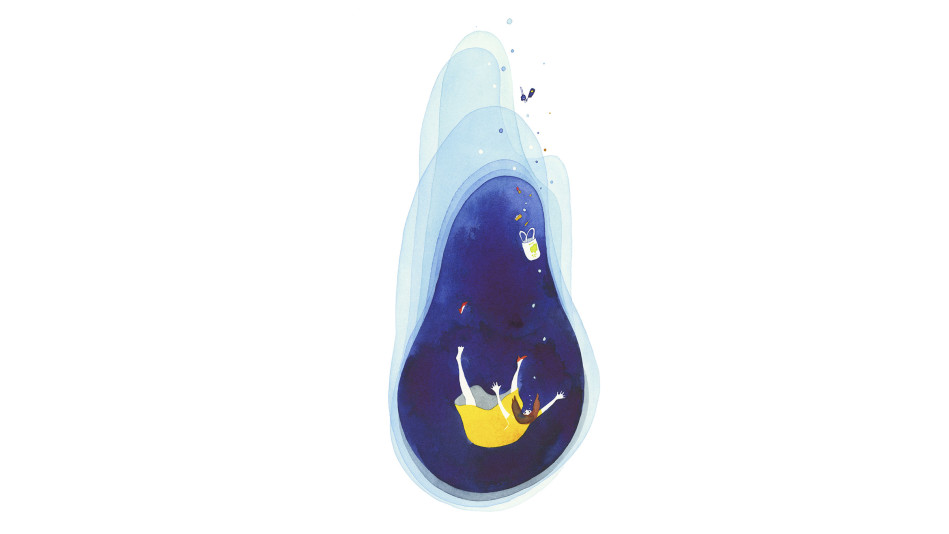How Perimenopause Triggered My Depression
Hot-flash news flash: The Change can bring more changes than you bargained for.

Photo courtesy of Richard McCor
While driving to pick up my daughters from school one afternoon, I remembered promising them we'd have their favorite dinner: make-your-own pizza. Oh no. This would require an extra trip to the grocery store to get the ropy pizza dough, plus the murderous kitchen cleanup afterward, with the spilled flour and sticky cutting board and...
And all at once life felt utterly, grimly hopeless, a thousand paper cuts of drudgery without reward or end. My mood fell down an elevator shaft. I tasted metal. I was overwhelmed with grief. For days, weeks, the pain continued. The sunlight was too bright. I would wake up with a weight on my chest. I cried for no reason. I would take a yellow pad and make hash marks (at 8 a.m., 9 a.m., 10 a.m....) to celebrate simply making it through the day.
Unbeknownst to me, the darkness was an effect of perimenopause. Menopause's lesser-known sister, perimenopause occurs when a woman's periods become irregular, typically around age 47. It can play havoc on her cycle by throwing estrogen and progesterone levels out of whack, which can affect not just the body (what's with the chin hairs?) but also parts of the brain like the hypothalamus, amygdala, and hippocampus. Since these are wired to memory, hunger, libido, and anger, one's behavior and personality can change startlingly. More good news? Because each woman is unique as a snowflake, perimenopause can start as early as in one's 30s and last between a few months and 15 years.
At the urging of a girlfriend who'd survived this turbulent passage, I visited her "dream gynecologist." While some—often male—doctors will see you for five minutes before prescribing pills, Dr. Valerie listened carefully as I described the hues, intensity, and timing of my depressive attacks (I wept all the while as she handed me tissues). She replied by saying that I could be helped in two ways. One: Stop heaping extra things on my plate. (Maybe I could change make-your-own-pizza night to make-and-clean-up-your-own-damn-pizza night.) Two: Steady the plate itself with the help of antidepressants or hormones.
To show me, she dabbed a pearl-size drop of estrogen gel on my inner wrist; though she said it may take a few weeks to have an effect, I instantly felt a tad better. I think it was less biology than the relief of feeling, for just a moment in my frenetic, overbooked day, mothered. (My own mother is long gone, and my old and frail father is yet another person I take care of.) It was a subtle but powerful shift in my self-image: I am not a machine. Sometimes it's important to stop and allow my body to recover, rather than cram in three more errands.
But most important, it was a relief for someone to name my condition—to reassure me that it was natural, was physical, and would pass.
And all at once life felt utterly, grimly hopeless, a thousand paper cuts of drudgery without reward or end. My mood fell down an elevator shaft. I tasted metal. I was overwhelmed with grief. For days, weeks, the pain continued. The sunlight was too bright. I would wake up with a weight on my chest. I cried for no reason. I would take a yellow pad and make hash marks (at 8 a.m., 9 a.m., 10 a.m....) to celebrate simply making it through the day.
Unbeknownst to me, the darkness was an effect of perimenopause. Menopause's lesser-known sister, perimenopause occurs when a woman's periods become irregular, typically around age 47. It can play havoc on her cycle by throwing estrogen and progesterone levels out of whack, which can affect not just the body (what's with the chin hairs?) but also parts of the brain like the hypothalamus, amygdala, and hippocampus. Since these are wired to memory, hunger, libido, and anger, one's behavior and personality can change startlingly. More good news? Because each woman is unique as a snowflake, perimenopause can start as early as in one's 30s and last between a few months and 15 years.
At the urging of a girlfriend who'd survived this turbulent passage, I visited her "dream gynecologist." While some—often male—doctors will see you for five minutes before prescribing pills, Dr. Valerie listened carefully as I described the hues, intensity, and timing of my depressive attacks (I wept all the while as she handed me tissues). She replied by saying that I could be helped in two ways. One: Stop heaping extra things on my plate. (Maybe I could change make-your-own-pizza night to make-and-clean-up-your-own-damn-pizza night.) Two: Steady the plate itself with the help of antidepressants or hormones.
To show me, she dabbed a pearl-size drop of estrogen gel on my inner wrist; though she said it may take a few weeks to have an effect, I instantly felt a tad better. I think it was less biology than the relief of feeling, for just a moment in my frenetic, overbooked day, mothered. (My own mother is long gone, and my old and frail father is yet another person I take care of.) It was a subtle but powerful shift in my self-image: I am not a machine. Sometimes it's important to stop and allow my body to recover, rather than cram in three more errands.
But most important, it was a relief for someone to name my condition—to reassure me that it was natural, was physical, and would pass.



